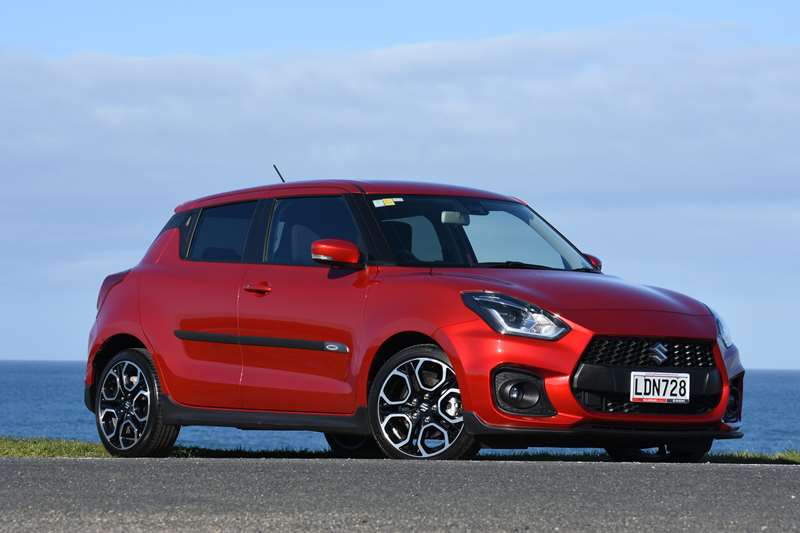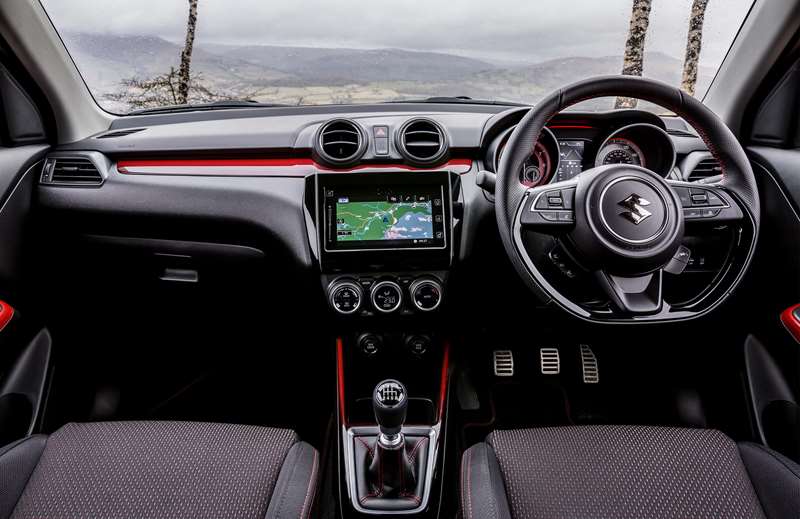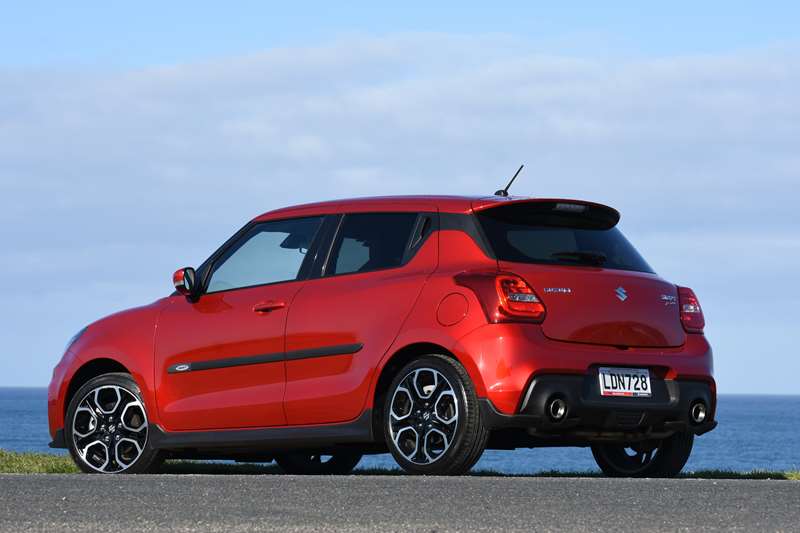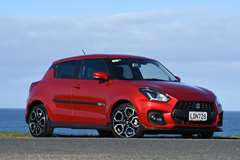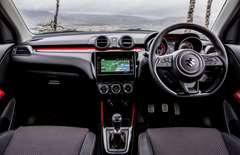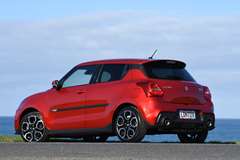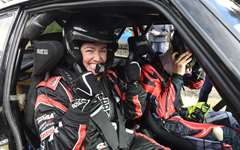| Price: | 29990 |
|---|---|
| Engine: | 1373cc four-cylinder direct injection turbo petrol, max power 103kW@5500rpm, max torque 230Nm@2500-2500rpm |
| Transmission: | Six-speed automatic, front-wheel drive |
| Brakes and stability systems: | Front ventilated disc, rear disc brakes, ABS, AEB |
| Safety: | Five-star ANCAP |
| Wheels and tyres: | Alloy wheels, 195/45 R17 tyres |
| Fuel and economy: | 6.1L/100km, tank capacity 37 litres |
| Emissions: | 141g CO2/km |
| Dimensions: | Length 3890mm, width 1735mm, height 1495mm |
Rating:
Overview
The latest Suzuki Swift Sport is equipped to take on the best of Asia and Europe, writes David
Thomson. And, judging by its sales figures, it's leading the pack.
JUDGING by this year's sales figures, the latest Suzuki Swift is proving every bit as popular
as its predecessor. With 1566 registrations up to the end of July, it is second only to the fleet
and rental market-favoured Toyota Corolla among conventional cars on the 2018 sales charts,
and looking a sure bet to hold that place to the end of the year.
While most buyers will favour the everyday GL, GLX and RS variants, it is the Sport version
that is the real attention grabber. Purposefully sports-kitted and featuring 1.4-litre turbo power
and a raft of advanced safety features, it is equipped to take on the best of Europe's compact
hot hatch brigade as well as its more obvious rivals from Asia.
Sharp pricing is part of the equation, with the manual listing at $28,500 and the automatic at
$29,990. Both feature six-speed gearboxes, while the automatic, which was the model supplied
for appraisal, is fitted with a manual shift mode and paddle shift controls.
Champagne yellow is Suzuki's hero colour, but the metallic red of the test car was pretty
striking, too. As well as bold colour options, a neat body kit helps the Swift stand out from the
crowd. It includes prominent carbon fibre accenting at the nose and tail, an aggressive front
grille, a roof-mounted spoiler and twin exhausts. Add in 17-inch alloys shod with 195/45 R17
Continental rubber, and there's plenty of road presence.
The cabin gets a visual lift courtesy of red trim inserts, front sports seats with ``sport''
embroidered just below the headrest, and a sports steering wheel. The cloth-trimmed seats,
steering wheel and gear lever gaiter all feature contrasting red stitching.
While the cabin looks the part and is well put together, the extensive use of hard plastic trim
provides a reminder that the Swift Sport is a sub-$30K hot hatch based on an everyday small
car that retails for under $20K in its base model.
In other respects, though, the Swift Sport is well equipped for its price. Accessed via a
7.0-inch colour touch-screen infotainment system are satellite navigation, Apple CarPlay and
Android Auto smartphone integration. The screen is configured in Suzuki's standard quadrant
layout, with one each for audio, phone, satellite navigation and smartphone.
Climate-control air-conditioning, keyless entry and push-button start are also present,
along with a reversing camera and rain-sensing wipers. Holding the maximum five-star Ancap
safety rating, the Swift Sport boasts adaptive radar cruise control, lane-departure warning
and weaving alert systems, and an auto-dipping function for its LED headlights.
The back seats were only used occasionally during our test, and provided decent head and
leg room for a car of the Swift's size. Luggage space is an adequate 265 litres when the rear
seats are raised, and 918 litres when folded down. There's no room for a spare wheel though;
instead, the Swift Sport comes with a ``get me home'' emergency puncture sealant kit.
Under the hood, the Swift Sport has basically the same booster jet 1.4 litre engine that
Suzuki uses on turbocharged versions of the current Vitara SUV range, producing the same
103kW of power, but slightly more torque (230Nm against 220Nm). Compared to the previous
Swift Sport, which has a non-turbo 1.6-litre engine, power is up by a marginal 3kW, but torque
has increased by a substantial 70Nm.
An engine that provides the Vitara with decent performance does a whole lot more for the
Swift Sport, which tips the scales at just under a tonne.
Acceleration is lively, with a 0-100kmh sprint time of about 7.5 seconds. With peak torque
produced from 2500rpm, the test car demonstrated strong in-gear acceleration. This,
combined with the engine's lack of turbo lag and linear power delivery gives the Swift Sport
ample verve for snappy overtaking.
The gearbox's manual mode is really a semi-manual mode, in which the car will always
switch gear of its own accord before the engine redlines. Even so, the extra driver control
provided via the paddle shift controls gives an additional level of involvement behind the
wheel.
The Swift Sport has a standard-cycle fuel consumption rating of 6.1L/100km. While that was
not equalled on test, a 7.1l/100km return was still good given the mix of driving involved. A
diet of 95-octane rather than 91-octane petrol is required.
Cruising around town and on main highways, the suspension thumps though potholes and
other major surface imperfections. Significant road noise is also apparent on the coarse-chip
seals that predominate in this part of the world.
While this detracts from the Swift Sport's refinement, it is easily forgiven when threading
the car down a winding back road.
While quite light, the steering is accurate and direct. The tyres grip strongly, and the chassis
and suspension give the Swift Sport the nimble, darting character required of an engaging hot
hatch.
The test car proved especially adept at taking sudden changes of direction in its stride: turn
in is particularly sharp, there is little body roll, and understeer is well-contained.
Perhaps best of all, the Swift Sport doesn't need to be driven at silly speeds to show its
dynamic best. Indeed, some of the greatest driving rewards on test came traversing the
tightest sections of minor roads at speeds well below the posted limits. That's what fun in a
compact hot hatch should always be about.
